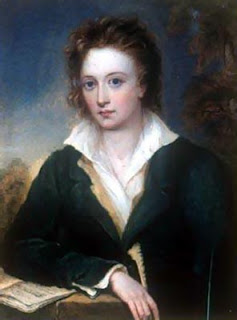In none of P. B. Shelley’s greatest contemporaries was the lyrical faculty so paramount. Whether we consider his (i) minor songs (ii) his odes, or his more complicated (iii) choral dramas, we acknowledge that he vas the loftiest and the most spontaneous singer in our language’ says Symonds, comparing Shelley to the other romantic poets. The lyrics of Shelley cover a wide range and variety and can be classified under three different heads:
(I) Personal Lyrics
(ii) Lyrics of Nature
(iii) Lyrics of Hope & Liberty
His lyrics are both personal and impersonal. Some of them deal with the subject while others with that of nature. Regeneration of mankind and the form and fashion of life in the future are the subject matter of some of his lyrics. Briefly speaki1g Shelley’s lyrics deal with the poet’s own personal life, the life of Nature and the present the future life of humanity under the impress of love.
Personal Lyrics:
Shelley’s personal lyrics are idealistic in character. They are not addressed to any mortal being but to an ideal or vision. The poet longs for ideal which he fails to attain in this work-a-day world. When Shelley’s personal lyrics deal with his own life, they are dipped in sentiments of melancholy and despair.
“Alas! I have nor hope nor health
Nor peace within, nor calm around
Nor that content, surpassing wealth
The sage in meditation found.”
The note of sorrow is heard, from one lyric, one after the other. The poet bemoans that there is no joy for him.
“Rarely, rarely, comest thou
Spirit of Delight,
Wherefore, hast thou left me now
Many a day and night?”
But Shelley is not always in melancholic mood, the note of hope and cheer breaks out in such lines as:
“If winter comes, can spring be far behind?”
Lyrics of Nature:
The lyrics which deal with certain aspects and phenomena of Nature, charged with deep passion which varies according to the poet’s prevailing mood at the time. Sometimes he saw nature as one and invisible. Other lyrics look upon Nature not as one being but many beings in which every nature objects has its own life. Some of these lyrics are mythical and create Nature myth as the famous poem ‘The Cloud.’
In some lyrics of Nature, Shelley identified himself with the forces of Nature and makes Nature an instrument of human regeneration. This is well wrought out in the ‘Ode to the West Wind’ where the poet seeks to use the power of the west wind for spreading the gospel of love and brotherhood in e world.
In some lyrics notably ‘To A Skylark’ the poet finds Nature and her life the sources of reflections on human life.
“We look before and after.
And pine for what is not,
Our sincerest laughter.
With some pain is fraught.
Our sweetest songs are those
That tell of saddest thought. ”
Lyrics of Hope & Liberty:
 |
| P. B. Shelley |
Some lyrics of Shelley are distinguished for their note of hope and liberty. Lyrics of regeneration have no taint of pessimism or despair. On the other hand, they sparkle with the poet’s optimism and revolutionary fervour. The ‘Ode to the West Wind’ is optimistic in character and the songs give expression to the poet’s aspiration for a new world order based on freedom and liberty. Shelley’s lyrics are marked with a note of spontaneity. They seem to come direct from the poet’s heart. They are absolutely effortless, “Shelley exhaled verse as a flower exhales fragrance.”
Music is the most important characteristic of a lyric and Shelley’s lyrics possess the quality in ample measure. He always “pants for the music which s-divine” and “showers a rain of melody”. He alone was the perfect singing God. Even Arnold who was Shelley’s worst critic could not but admire his music and said. “The right sphere of Shelley’s genius was the sphere of music.”“To The Skylark” is a triumph of musical harmony. The metre used for it accords with the very manner of the bird’s song and that of the cloud gives the impression of fast changing sky when swiftly floating across it. The music of his lyrics changes with the change of emotion. The vibration of rhythm in harmony with the vibration of emotion is the chief loveliness of Shelley’s lyrical music.
Shelley’s lyrics possess an emotional ecstasy. The note of rapturous joy disappears when the poet comes to present his own life. His autobiographical lyrics are uniformly sad. In The Stanzas Written in Dejection near ‘Naples’ the poet sounds a melancholic note which touches our heart.
“Alas! I have nor hope nor health
Nor peace within nor calm around
Nor that content surpassing wealth
Nor fame, nor power, nor love,
Others I see whom these surrounds.”
In ‘Ode to the West Wind’ the personal lament becomes very piercer the agony of the poetic heart flows out in the following lines.
“O lift me as a wave, a leaf, a cloud I fall upon the thorns of life, I bleed.”
Shelley’s lyrics have been scoffed at by some critics as being vague and substanceless. Vagueness in lyrics is caused by the swift succession of similes and incessant flow of emotional fervour. Vagueness is also produced by the ethereal quality of his verse.
Simplicity and rapture are the twin essential qualities of lyric. A lyric the expression of a passionate ideal and besides being rapturous pure passion is always simple whether it is the passion of love, hatred or joy; Shelley’s lyrics are characterized by simplicity & rapture.

Comments
Post a Comment
Drop any query, suggestion or comment here.